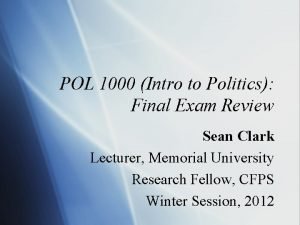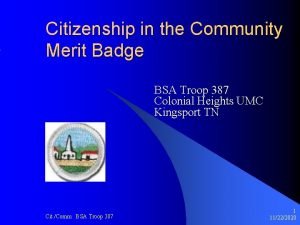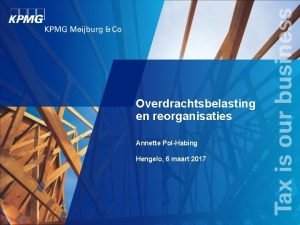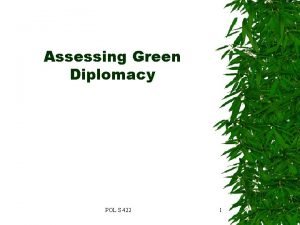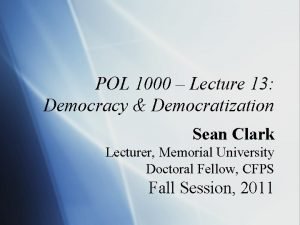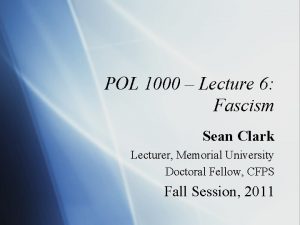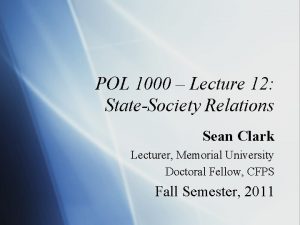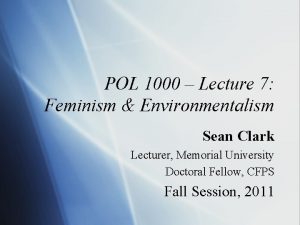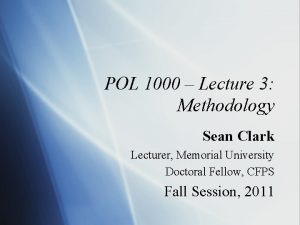POL 1000 Lecture 17 Citizenship Political Community Sean








- Slides: 8

POL 1000 – Lecture 17: Citizenship & Political Community Sean Clark Lecturer, Memorial University Doctoral Fellow, CFPS Fall Session, 2011

Lecture Arc § 1. Citizenship. § Origins. § Modern Conceptions. § 2. Political Leadership § [time permitting].

Citizenship § What are the rights & obligations that go alongside membership in a political community? What should they be?

Origins of Citizenship § Dates back to Greek polis of antiquity, i. e. Plato, Aristotle. § Free, adult males seen as equal members of the community. § Thus w voting rights, i. e. Athens, in return for participation in politics & defence of the polity in times of war. § Far different than the subject relationship in neighbouring Persian empire. § Aristsotle’s Politics part of effort to regenerate fallen Athens, but returning citizenship as central to the good and rational life of man. § Important even to Roman Empire. § Citizenship meant equality under the law & protection by the state. § Feudalism downplayed idea of citizenship (i. e. serfdom), but reemerged in 16 th & 17 th. Cs. § New middle class wanted to protect that which they had earned. § French Revolution: links idea of citizenship w political equality & social fraternity. § ‘Declaration of the Rights of Man’ = first push towards universality (‘we are all born free’).

Modern Citizenship § Enjoyment of rights is a common expectation of citizens, now taken for granted. § 18 th. C UK: civil rights (i. e. religion & speech). § Late 19 th. C & early 20 th. C: political rights (i. e. franchise to more than just property owners). § 20 th. C: social rights (i. e. welfare state). § Yet what of obligations? What owe in return? § What of the ‘underclass’? What of their status? § Poverty &/or minority status can = effective disenfranchisement. § Citizenship rights can be difficult to access, & even sometimes taken away (i. e. US movt to remove 14 th Amendment, re birth & citizenship). § Also, what of non-Western traditions. § Family or tribe often play >er role than state citizenship (i. e. Ankole & Baganda in Uganda). § Finally, what is potential for ‘post-national’ citizenship? § How be a member of community broader than state, i. e. EU?

§ "A popular government without popular information or the means of acquiring is but a prologue to Farce or Tragedy or perhaps both. " "A people who mean to be their own Governors must arm themselves with the power knowledge gives. " § James Madison


fine, we need not ask much of each other. But if we think it matters, that we are trying to achieve together is important, we might be more willing to ask that we put aside other, competing commitments — that we put each other first. When JFK called upon Americans to “ask what you can do for your country, ” he did not mean them to ask “which one? ” Perhaps you will think that is too much to ask of each other. Fine: but is it at least something we could ask of those who seek to lead us? To lead, after all, they must be able to inspire us to follow. To gather consensus, to rally us to difficult tasks, to lift our spirits in times of crisis: all these require a special bond between the leader and the led. A candidate for party leader is expected to give up previous party affiliations. Should it be different for a candidate for prime minister? He asks us to choose him. Is it too much to ask that he choose us? National Post
